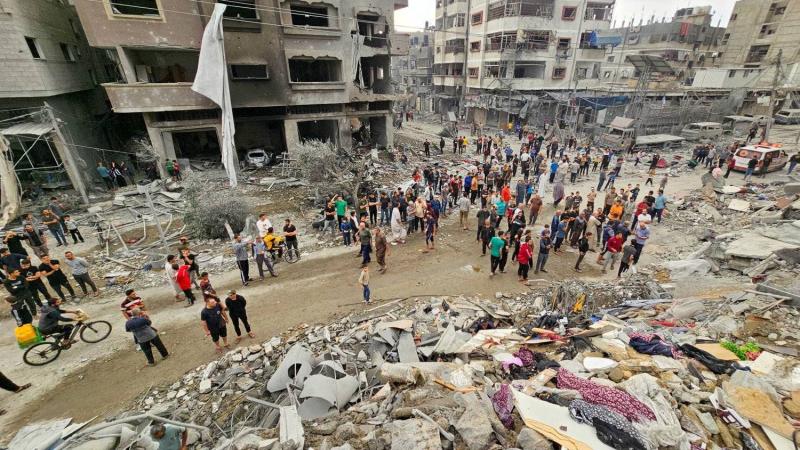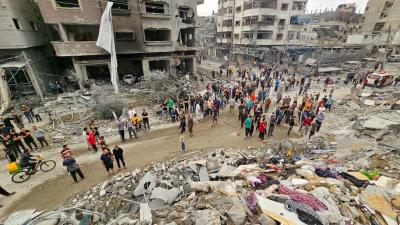US, Egyptian, Israeli, and Qatari officials are expected to meet in Cairo today, Tuesday, in an effort to reach a ceasefire in Gaza. This comes as the southern corner of the Palestinian territory is crowded with over a million civilians anxiously awaiting a potential Israeli assault. Amid growing international concern over the tragedies faced by civilians, residents reported that Israeli tanks bombarded the eastern part of Rafah overnight, even though the anticipated ground attack does not seem to have begun.
The Israeli military stated that its forces killed dozens of Palestinian fighters in clashes in southern and central Gaza over the last 24 hours, including 30 in Khan Younis, a city near Rafah along the coastal border with Egypt. Health officials in Gaza reported that an Israeli strike on a home in the Al-Nuseirat refugee camp in central Gaza resulted in the death of 16 Palestinians last night. Residents noted that Israeli tanks have advanced further into Khan Younis from both the west and east amid continued shelling. Israeli forces have directed displaced persons in certain shelter centers to move toward Rafah. However, the sound of shelling from tanks in eastern Rafah has caused panic in makeshift camps housing the displaced.
As the war between Israel and Hamas enters its fifth month, attention is now focused on the situation in Rafah, where approximately half of Gaza's 2.3 million residents live under dire conditions, many of whom have fled from other areas devastated by Israeli attacks. Israel claims it intends to eliminate Hamas fighters operating in Rafah and plans to evacuate civilians, but relief officials and foreign governments assert that there is nowhere for them to go, and Egypt has stated it will not allow a mass influx of refugees across its borders.
Much of the densely populated territory has been reduced to rubble, with 28,473 Palestinians killed and 68,146 injured since October 7, according to health officials in Gaza, who reported 133 Palestinian deaths in the last 24 hours. Many more are believed to be buried under the rubble. Supplies of food, water, and other essentials are dwindling, and diseases are spreading. Aya, a 30-year-old living in a tent with her mother, grandmother, and five siblings, said, "Since Israel announced it would soon invade Rafah, we pray our final prayers every night. Every night we say goodbye to each other and to our relatives outside Rafah." She told Reuters through a messaging app, "If the world does not show some mercy and stop Israel from attacking Rafah, we believe we will not survive... The sounds of bombing and explosions grow closer."
### Ceasefire Agreement
US President Joe Biden and Jordan's King Abdullah pressured for a ceasefire yesterday, Monday. Biden told reporters in Washington, "The United States is working to reach an agreement on the hostages between Israel and Hamas that would bring an immediate period of calm in Gaza for at least six weeks." The hostages were taken during the attack by Hamas gunmen on southern Israel on October 7, which resulted in 1,200 deaths and triggered the Israeli military response. Securing their return is a priority for Prime Minister Benjamin Netanyahu's government, which also aims to eliminate Hamas, which governs Gaza.
King Abdullah stressed the grave situation for Palestinians, especially those trapped in Rafah, saying, "We cannot stand idly by and let this situation continue. A permanent ceasefire is urgently needed now. This war must end." Sources indicated that senior officials from the US, Egypt, Israel, and Qatar are scheduled to meet in Cairo to work on a three-phase framework that would lead to the release of hostages and achieve a prolonged ceasefire.
### US Frustration with Israel
Biden has shown increasing frustration with Netanyahu for not responding to calls for greater efforts to reduce casualties and protect civilians in Gaza. He urged Israel not to carry out a ground attack in Rafah without a plan to protect the Palestinian civilians gathered there. The United States is Israel's closest ally and its largest supplier of weapons, providing $3.8 billion annually in military aid, and there is no indication that Washington will halt this aid. The US State Department stated that cutting aid would not be "more effective than the steps Washington has already taken."
Netanyahu instructed the Israeli army last week to formulate a plan for the evacuation of civilians during any ground assault. In response to inquiries about these plans, an Israeli army spokesperson stated yesterday that it is still unclear how this would be executed.
The United Nations intensified its calls for a ceasefire yesterday and opposed the idea of relocating civilians in Rafah. UN spokesperson Stephane Dujarric told reporters, "We will not be party to the forced displacement of people. In fact, there is currently no safe place in Gaza." He added, "You cannot return people to areas filled with unexploded ordnance, let alone the lack of shelter." European Union foreign policy chief Josep Borrell indicated that the way to reduce civilian casualties is to halt arms supplies to Israel.




